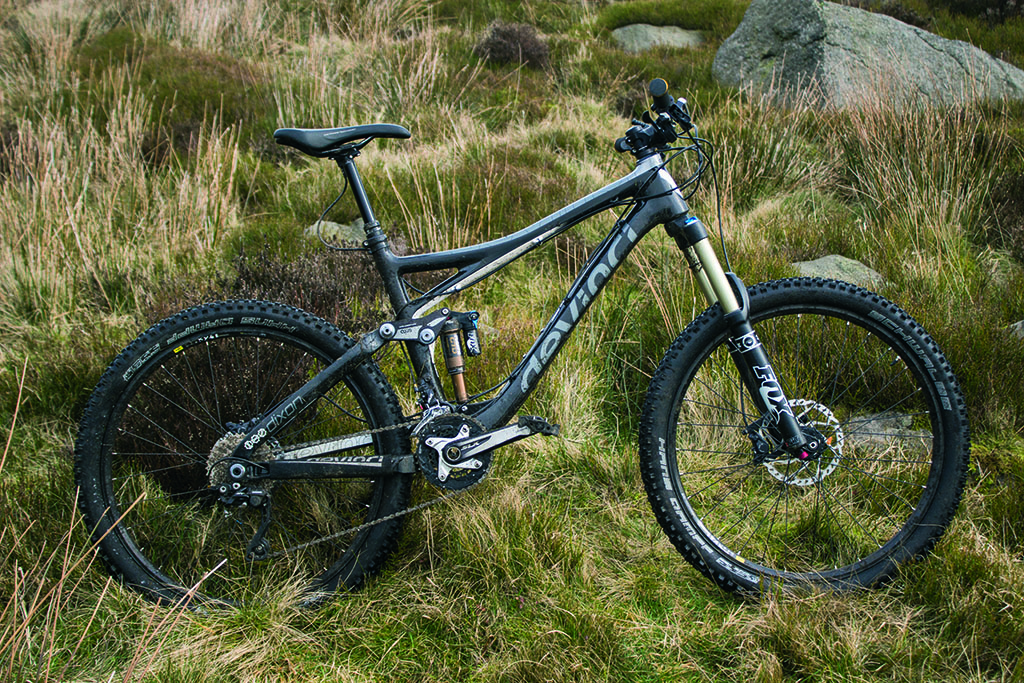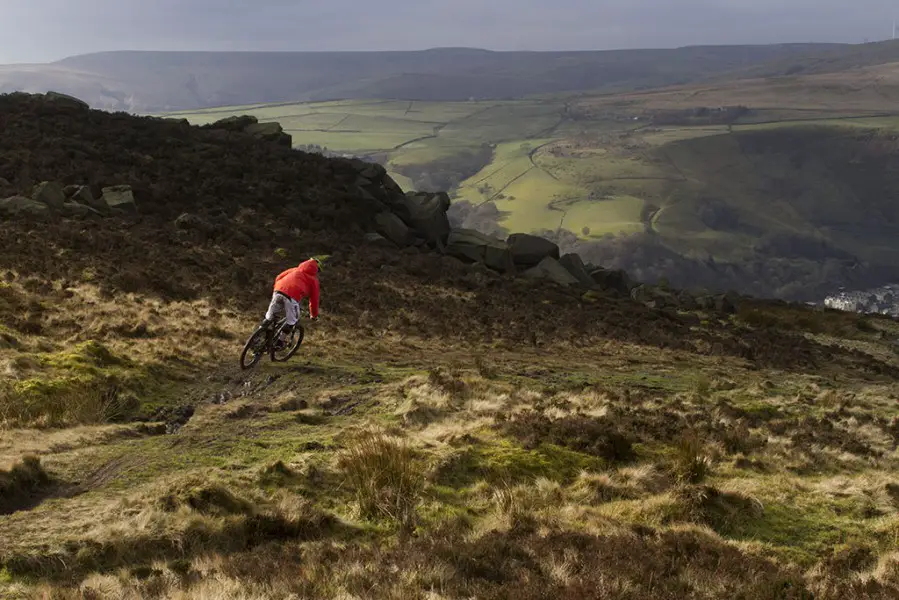The carbon-framed Canadian-assembled Dixon is essentially the 145mm travel hard-hitting trail version of the Devinci Wilson, the bike that took Steve Smith to his World Cup downhill overall victory last year.
The fact that Smith chose to race the Dixon instead of the Wilson on less demanding courses speaks volumes for the abilities of its Dave Weagle-designed Split Pivot frame configuration. In fact, for a penny under £4,000 it appears to be one of the best combinations of acceptable weight and outstanding ride-ability for the most demanding riders, especially for those who want a bike that can easily tackle competitive enduro and tamer downhill events as well as regular high speed technical trail riding.
The only frame sections that don’t use Devinci’s custom carbon layup are the aluminium chain stays and the Intelligent Link shock rocker, which can be set in two positions at the top of the ‘seat stays’ to create a half degree difference in the head angle and a 6mm difference in bottom bracket height. The rocker compresses a Fox Float X shock with CTD settings to complement the 160mm travel Fox 34 fork and the complete bike comes with a 2×10 drivetrain, with ISCG tabs allowing a swap to a single crankset and chain guide combo for race level downhill duties. The bottom bracket is press-fit.
The finishing kit is all compatible with the bike’s obvious potential. Sturdy but still relatively light wheels use SRAM X9 hubs and Mavic’s tough EN321 rims, shod with Schwalbe’s superbly grippy Hans Dampf 2.35in Trailstar tyres. The brakes, shifters, crankset and front mech are from Shimano’s SLX group, the rear mech is XT, there’s an Easton Haven stem and 750mm handlebar, RockShox Reverb dropper post and a comfortable Selle Q-Bik saddle. The cabling is externally routed, apart from the cable to the rear derailleur which goes through the neoprene-wrapped chainstay. The underneath of the down tube is fitted with a plastic guard to protect it from front wheel rock spittage and there’s one set of bottle cage bosses. There’s lots of mud room around the tyres and a squat tapered head tube, zero stack Cane Creek headset and low rise bar prevents the long-forked front end from feeling lanky on normal trails.
Trail Notes
There are 145mm travel bikes with slightly plusher back ends than the Dixon, but not many of them can also climb and accelerate this well.
The axle-centric pivot, swingarm and shock configuration of the Dixon makes for a suspension feel that manages to be rock steady on climbs but surprisingly fluid over every type of bump. Acceleration, both sitting and standing, is pert enough to make you think you’re on a short travel bike, to a point where we never felt the need to use the shock’s ‘Climb’ position and only used the ‘Trail’ position on a few of the more predictably smooth sections. Once you’ve got the shock pressure right (around 30% sag seems to suit most riders) the ‘Descend’ setting is fine for almost all flattish or downhill trails. It irons out the pitter-pattery stuff to the extent that you forget about the slightly choppier ride of the 26in wheels and it absorbs the bigger hits with an ease that allows you to keep the power down and revel in the duck and dive chuckability of the bike’s handling prowess.
The Dixon’s relatively cautious build and middleweight componentry makes it heavier than a lot of trail-dialled mid-travel bikes and there are certainly times when you feel that on longer climbs, especially if compared to bikes with less grippy, faster rolling tyres. But that has to be set against the fact that the long fork, relatively slack geometry (the head angle is just over 66° static on the lower bottom bracket setting) and hard riding componentry allows you to take a lot of calculated risks on gnarly downhill terrain, keeping speed and control high without having to shuffle your weight too far back. You just let the fork take the brunt. In most cases, there’s enough bottom bracket clearance to keep pedalling through stuff even in the lower, slacker rocker setting, which feels great on pedally downs, but we preferred the higher, steeper set-up for regular lumpy trails. When it comes to long hauls back up, the generous top tube reach and low bar position is ideal in terms of allowing you to use your core back and arm strength and stay sitting down. We rarely used the almost locked out ‘Climb’ setting on the fork as the ‘Trail’ position is fine for either seated or standing ascents. In a nutshell, a great all-rounder at a good price for riders who like to push a bit harder than most mid-travel trail bikes allow.
- Frame // Carbon DMC-G, Fox Float X CTD 145mm shock
- Fork // Fox Float 34 CTD 160mm
- Hubs // SRAM X9 32 spoke, thru-axles
- Rims // Mavic EN321 eyeleted
- Tyres // Schwalbe Hans Dampf 2.35in Trailstar
- Chainset // Shimano SLX 24/38t
- Front Mech // Shimano SLX
- Rear Mech // Shimano XT
- Shifters // Shimano SLX 2×10
- Brakes // Shimano SLX 160/180mm rotors
- Stem // Easton Haven
- Bars // Easton Haven 750mm
- Grips // Devinci Lock-on
- Seatpost // RockShox Reverb 125mm
- Saddle // Selle Italia Q-Bik
- Size Tested // Medium
- Sizes Available // S, M, L
- Weight // 30.6lb without pedals
Review Info
| Brand: | Devinci |
| Product: | Dixon RXS Carbon |
| From: | Freeborn, freeborn.co.uk |
| Price: | £3,999.99 |
| Tested: | by Steve Worland for |


